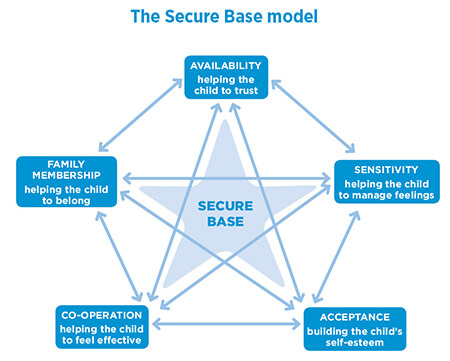Therapeutic Parenting in Foster Care
Previously, we discussed how therapeutic care can be one of the more effective parenting styles for foster parents. What is therapeutic parenting? It is a consistent parenting approach designed to meet a child’s needs, forgoing punitive discipline in favor of a more empathetic approach. The goal of therapeutic parenting is to re-route pathways in the brain that have been rewired by the mental trauma of adverse childhood experiences (ACEs). There are different models used to facilitate this approach, and here we will examine the Secure Base model*.
Understanding the Concept of a Secure Base
What is therapeutic fostering with the Secure Base model? It is a strategy drawn from attachment theory and adapted to include the aspect of “family membership”, specifically for foster children, who have been separated from their families. The idea is to provide a consistent, reliable base for children so that they can feel grounded enough to explore, knowing there is a safe haven for them when they have difficulties. For children who have not experienced sensitive parenting and may be struggling with managing their emotions, thoughts, and behaviour, the Secure Base model can promote security and resilience, helping children develop in a healthy way.
The Five Dimensions of Caregiving
The Secure Base model operates on the theory that there are five dimensions of caregiving: Availability, Sensitivity, Acceptance, Cooperation, and Family Membership. These dimensions overlap and combine, and each is associated with a corresponding developmental benefit for children.
- By being available, you help your children to trust.
- By being sensitive, you assist children in managing their own feelings and behaviour.
- When you accept a child, you help to build that child’s self-esteem.
- Cooperation helps children feel effective.
- Family membership gives the child a feeling of belonging.
Effectively Implementing the Secure Base Model
To use this framework for therapeutic caregiving, you’ll focus on the daily interactions between caregivers and children while considering how these relationships give children the skills to competently explore the outside world. Think about how your interactions with your children can shape their thinking, feelings, and behaviour. Consider, too, what is happening in your own mind, and how your thoughts and feelings determine your caregiving tactics. It is natural for a caregiver or parent to draw on learned ideas about parenting from experiences or training. These ideas impact the caregiving behaviour, and this in turn conveys messages to the child, affecting the child’s thoughts and feelings about him or herself and other people.
By structuring your parenting on the Secure Base model, you will be better able to nurture the social, emotional, psychological, and intellectual development of your children. You are likely to find it easier to identify your children’s needs, and this will allow you to provide a secure base from which the children can explore, learn, and develop in a healthy way. For foster carers, this model can be an effective and rewarding way to fine tune parenting skills.
A More In-Depth Look at Secure Base Parenting
To effectively practice therapeutic caregiving, you must be deliberate and purposeful in your parenting. The Secure Base model gives you a framework from which to work as you incorporate the different dimensions into your caregiving. Let’s look a little more closely at how each dimension fits into parenting.
Availability
Making yourself available to a child means being there emotionally and physically. Available parents are alert to the children’s needs and signals, responding to them in a way that helps change their expectations of themselves and adults. Noticing their feelings and wishes in a responsive way can help encourage them in their personal goals. In times when you are apart let your foster child know you are thinking of them; send a text asking what they would like for tea or to wish them good luck in a test for example.
Sensitivity
Foster children, in particular, need to be treated with sensitivity. Foster carers who are sensitive (that is, they can anticipate stress and read signals) can identify with their foster children’s needs and perspective, seeing the world from their point of view. When children are seen in this way, they learn to manage their emotions and thoughts more productively. There may be times when a foster carer needs to support their foster child by naming the thoughts and feelings that they seem to be experiencing; the child may not have the ‘emotional literacy’ to name them for themselves. For example, many children use the word ‘sad’ when asked how they are feeling, as it is a very common word. In reality it may be anger that they are feeling but are not familiar with the word.
Acceptance
Unconditional acceptance by a parent or caregiver is a basic need of all children, but especially foster children. Unless you can accomplish this, you will have difficulty making progress in the relationship with your foster child. Promote the idea in the family- ‘Nobody’s good at everything but everybody’s good at something’. Model and teach the child to accept and celebrate difference in self and others.
Co–operation
One of the primary goals of parenting is to help children gain greater independence and a sense of their own worth. Involving your foster children in co-operative tasks-planning a trip together for example and problem solving gives them confidence and a feeling of effectiveness that helps them succeed. Offer even a very young child choices – what cereal to buy or which coat they want to wear- will help the child to start to feel they can make things happen.
Family Membership
Every person needs to feel a sense of belonging, acceptance, and inclusion in order to explore, grow, and develop as a person. For foster children who have been separated from their families, this can be a challenge. You can instil a sense of belonging in your foster children by giving them their own spaces in your home, accommodating their norms and preferences, and displaying their photos alongside photos of other family members. As your foster children begin to feel a sense of family membership, they will be more confident and effective in the outside world. It is important that foster carers also enable the child to talk about and value their birth family identity. Most children with have some level of contact with their birth family; it is important that foster carers manage contact in ways that promote the child’s well-being and comfortable sense of belonging in both families.
Becoming a Foster Carer
The Secure Base model is a strong strategy for parenting any child, and it can make you an especially effective foster carer. Are you interested in becoming a foster carer? At Acorn Fostering Services, we provide good quality foster placements for children and young people, and we are always looking for foster carers who can offer children sensitivity and care. An Ofsted approved and registered independent fostering agency, we are based in Leicester and provide fostering agency services throughout the East and West Midlands and Northern Counties, helping establish foster families and providing foster parenting help when needed. If you think you have the life experience and qualities that would help you care for children of all types and you want to learn more about foster caring, call us on 0116 251 3550 at or contact us through our website.
* The Secure Base model was developed by Professor Gillian Schofield and Dr Mary Beek in the Centre for Research on Children and Families at the University of East Anglia, UK. You can find more information on the Secure Base model here.




